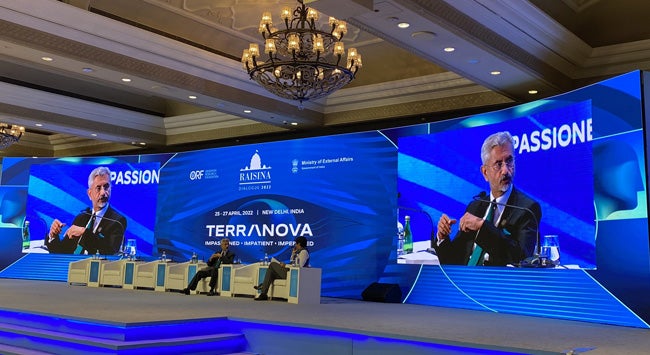Summary
The 2022 Raisina Dialogue in New Delhi covered a litany of international issues dominating the global order with speakers identifying pathways and opportunities for countries to collaborate across issues like climate, health, technology and finance.
The last week of April 2022 saw Delhi in a diplomatic frenzy with the sixth edition of the Raisina Dialogue. The world has changed since the last time the dialogue was held in person. The pandemic has reordered international affairs. A recent intervention is reordering European geopolitics. China’s role and future in the Indo-Pacific is hotly contested and covered. Technology intersects with every aspect of society and economics. How countries determine and sort out the effects of technologies has impacted future global trends. Climate change now dominates global discussions. This year’s Raisina dialogue sought to cover these issues both thematically, through climate or technology or finance and how they are intersecting with or affecting broader geopolitical and geo-economic currents with special attention given to India. At the front and centre was the potential of the European Union-India relationship in dealing with ongoing global challenges based on shared values and interests.
The 2022 dialogue discussed various responses to challenges that have emerged from the pandemic, while finding pathways for countries to cooperate in the post COVID-19 world. Speakers engaged with the latest war in Europe, and its potential consequences for the region and the world. Afghanistan found mention as a similar crisis that should not be forgotten. Indian Foreign Minister Dr S Jaishankar reminded the audience that conflicts were not solely a European or Trans-Atlantic concern. In fact, South Asia has been home to recent crises, especially Afghanistan after the United States pullout, which the international ‘rules-based’ order failed to manage. Jaishankar’s remarks appeared to point clearly to interlocutors who were pressing India to desist supporting Russia, at least tacitly, that India’s strategic interests and independent outlook trumped external calls. He added that India must not seek favour with other countries but remain “confident about who we are. I think it is better to engage the world based on who we are, rather than try and please the world as a pale imitation of what they are.”
The COVID-19 pandemic was another key issue of focal point. The focus fell on the technological implications wrought by the pandemic. The pandemic has altered the role of technology in our lives with startups, unicorns and big tech companies becoming invaluable to consumers and users, helping propel the rapid growth of India’s technology ecosystem. The metaverse, the latest manifestation of cyberspace, was discussed. Speakers mulled whether the shift to a metaverse would imperil its position as a soft space and see the formation of a harder more regulated domain with multiple actors, states and private companies vying for primacy. We need to start thinking of how to regulate new cyberspaces like the metaverse and Web 3.0. Web 3.0 refers to the next iteration of the internet, where websites and apps can handle data in using technologies such as machine learning, Big Data, and decentralised ledger technology, among others. Data, moreover, will be interconnected and decentralised, ahead of our present version of the internet (Web 2.0), where data is largely housed in centralised repositories. Web 3.0 could be a game-changer for India in terms of how it will change every industry through greater and deeper digitalisation. Web 3.0 should also improve people’s lives, creating more jobs and possibilities for a successful economy if adequate policies and regulations are passed to harness the technology’s potential.
Technology also affects geopolitics that is likely to be shaped by the competition between China and the United States (US). Specifically, China’s high-technology ambitions in artificial intelligence, big data, 5G, nanotechnology, biotechnology, drones, internet of things and quantum computing could shift or tilt the balance of power and influence vis-à-vis rules in the international order. India has a role in how this competition pans out both bilaterally and regionally through mechanisms like the Quad, which received some attention at the dialogue. Speakers argued that the Quad could become the leading mechanism amongst the Indo-Pacific partners, especially democracies, on critical and emerging technologies to ensure technology rules and standards are negotiated and governed by shared interests and values. The Quad’s focus on emerging technologies underlines the importance of reliance on technologies to shape the international order, restore common rules of engagement, and contribute to a global order that is open, reliable and safe from a technological point of view.
It was clear at Raisina that the international order was very much in flux – crises abound. Democracies face headwinds. As COVID-19 continues to loom large over the world, the future of the international order remains under considerable scrutiny. In a world marked by the growing rivalry between the US and China, the collapse of Afghanistan, unceasing climate-related disasters and events and the Russia-Ukraine conflict, countries are groping for order of some sort. Climate action appears urgent and imminent, a challenge that green technologies and investments could help tackle before we experience adverse climate events. India, as the dialogue forward, has the potential to play a constructive role in addressing these challenges through new and existing coalitions, groupings, organisations, and frameworks.
. . . . .
Dr Karthik Nachiappan is Research Fellow at the Institute of South Asian Studies (ISAS), an autonomous research institute at the National University of Singapore (NUS). He can be contacted at isaskn@nus.edu.sg. The author bears full responsibility for the facts cited and opinions expressed in this paper.
Photo Credit: @NayanimaBasu
-
 More From :
More From :
-
 Tags :
Tags :
-
 Download PDF
Download PDF



